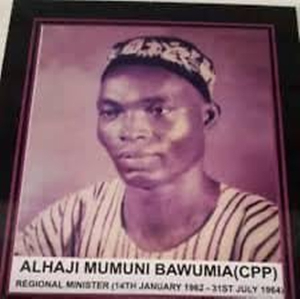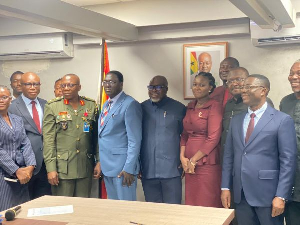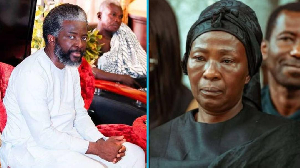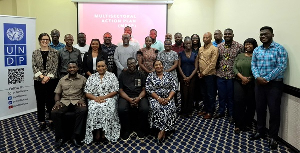The report ?Graphic?s mismanagement- MD must resign? (ghanaweb.com?s Feature Article of Monday, 22 March 2004) carried by Gye Nyame Concord on 15 March entitled ?Graphic hands over 49 percent stake in West Africa for ?1? and subsequently carried by ghanaweb.com reveals the deficit of understanding the global development game by not only Accra but the entire West Africa in their development process. The development game today is information driven, whether you like it or not, and the media is the key motor to power this development process as Kwabena Yiadom-Boakye, who describe himself as a retired social commentator, made clear at ghanaweb.com on 22 March 2004.
Before I go further, I have to state that I have been working with West Africa (WA) for the past 16 years from Freetown, Sierra Leone and covered especially the western realm of the West African region (one can check any prominent NGO, African studies outfits, universities/colleges, diplomatic missions, think tanks or any global government institute (s)?the Canadian Ministry of Immigration and Citizenship, for instance, has been subscribing for WA for the past 30-something years).
Gye Nyame Concord has done well in bringing the troubles of WA out for public knowledge, especially in the local and global Ghanaian community. I am indicating Ghana more specifically because WA is legally owned by Ghana (Before Ghana, Nigeria had owned it. And before Nigeria the British colonial regimes in West Africa had owned it). It is unfortunate that the poor management by the Accra-based Daily Graphic has brought WA down. It reveals also how Daily Graphic itself is managed.
Based in Ottawa, Canada for the past ten years and working via computer-assisted/online reporting tools (a new genre in journalism largely developed by the United States), I don?t know most of the guys down there in Accra, though my colleagues such as Sierra Leone?s Desmond Davies, the editor, Ghana?s Frank Afful, the Managing Editor, and Ghana?s Bernard Otabil, the business editor, and other staff workers in our London office, who have not been paid for almost one year, like me (I am owned almost $20,000.00), have been interacting with them. The Lagos, Nigeria-based correspondence, Ben Asante, is owned over ten thousands of British pounds sterling. Other correspondents, based in various parts of the world such as the Washington, U.S.-based James Butty (a Liberian), the Paris, France-based Ibrahim Seaga Shaw (a Sierra Leonean) and the Moscow-based correspondent, Kester Komelagah (a Ghanaian), have been communicating with me, complaining about their distresses. This atmosphere deeply undermined the enthusiasm of correspondents (Enthusiasm is one of the key elements in journalism?you may have the degrees in the world or write like Nigeria?s Wole Soyinka, if you don?t have it, you have to say bye, bye for the trade). I am revealing all these for short-changed subscribers of WA, as one Kwabena Yiadom-Boakye, wrote to ghanaweb.com, to understand the troubles WA went through before its slumber. WA was run in such a terribly abysmal way that it appears as if there were no managers. The Romanian owners did not trust the African editorial team, more out of racist reasons than incompetence or qualification?in fact, aside from me with Master?s degree from Canada?s Carleton University in Ottawa in journalism, most of the correspondents have Master?s degrees from diverse disciplines/or programs. The editor, Desmond Davies has Master?s degree in Mass Communication from U.K.?s Leicester University. In fact, Bernard Otabil, the business editor, has an MBA and repeatedly advised, or rather warned, the Romanians of the coming collapse of WA, to the extent of writing a realistic business proposal, pro bono, out of sheer zeal to help halt the declining WA but the Romanians, described variously as racists, did not take Otabil?s proposal seriously. Added to all these, as expected, both London and Accra officials of WA did not answer phone calls or e-mails or letters, a sign of poor management. In fact, almost all the Romanians who were moving through the offices of WA in London and Accra were semi-literate, have no understanding of a media outlet of WA?s range and operated it like what may be described as a Kumasi businessman/woman outfit--a buy and sell venture.
The value of reviving WA goes beyond any business novice with plentiful money-bag. As the chief mouthpiece of the entire West African region and as the forum for the discussion of West Africa?s development process, WA cannot be allowed to sleep in this crucial time of West Africa?s development history, where complicated development issues such the implications of juju-marabou, small arms proliferations, HIV/AIDS pandemic and other dreadful diseases, protracted security issues, poverty and cultural distresses call for a magazine of WA?s international calibre to explain West Africa?s development to West Africans (and Africans) and the rest of the world just as CNN, the BBC, Asia Week, International Herald Tribune, Time or Newsweek magazines do for the cause of the Western world?s development process. Still, in a region (and a continent) that is yet to not only understand each other but also do not know each other properly, WA remains the key regional outfit to do this based on its global reach, its clout, its history, its culture, its qualifications, and its experiences--a strategically sound value and vision for a region that is ranked by global institutions such as the United Nations as the poorest in the world. While Ghana has put WA to sleep (which reveals Accra?s low development vision and management), West African governments, private businessmen/women, ECOWAS, the African Union (AU) and other governments outside West Africa can take over WA for the good of the region and the continent.
WA is a highly profitable outfit if managed properly on sound business principles. In fact, as I have discussed variously with my WA and other African/non-African colleagues, if managed well there is a huge market in the United States (Some colleagues tell me the continental European market has not been properly exploited for business). A Spanish or French edition, like Jeune Afrique or Time or Newsweek magazines, has huge market internationally not only in the western hemisphere but the increasing African population in the diaspora who are thirsty for sound analytical news about West Africa, Africa and diasporan Africans (Anthropologically and historically, most African-Caribbeans, African-South Americans and African-North Americans originally came from West Africa). An editorial policy based on these could open up huge markets for the profitability of WA in the long run.
Let those involved in reviving WA move on, driven by West Africa?s development process and the global development game being motored by today?s information system, and through this, help reinvigorate the region?s elements for progress.















